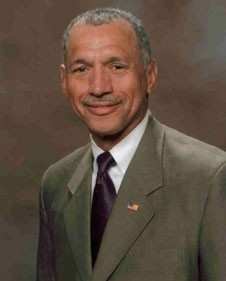House Committee Question Administrator Bolden On Slow-Rolling SLS Development, Planetary Science Cuts
In a hearing of the House Science, Space, and Technology Committee held last week to review the fiscal year 2013 (FY13) budget proposal for NASA, members expressed several concerns to Administrator Charles Bolden (pictured) over funding priorities.

While noting the schedule slips that have plagued the commercial cargo demonstrations flights, Committee Chairman Ralph Hall (R-TX) expressed his concern that NASA is not expediently developing a backup vehicle to ensure American access to the International Space Station (ISS). “I continue to be frustrated that the Space Launch System and Orion crew capsule are not being developed quickly enough,” Chairman Hall said in his opening remarks. “Current plans indicate they won’t be operational until 2021, which conceivably comes after the ISS is retired. SLS and Orion deserve higher priority.”
In that regard, Chairman Hall expressed concern that should the Russians suffer any disruptions, or commercial providers fail to prove their capabilities in 2017, the U.S. would have no means of getting crews to or from ISS.
For FY13 NASA is requesting $17.71 billion, a decrease of $58 million from its FY12 appropriation. Chairman Hall said that “given the tough fiscal times we are in, I think the agency’s top-line request is reasonable.” However, he and several Republican Members questioned the Administration’s priorities for how that funding is distributed across NASA’s directorates.
Over the last three years the President’s requests have underfunded development of manned exploration accounts while substantially increasing funding for Commercial Crew. Several Members questioned Administrator Bolden on these funding levels, saying that they expect NASA to abide by the policy direction and funding limitations that were signed into law under the last NASA Authorization Act.
Chairman Hall has long supported the development of commercial capabilities as a worthy goal, but not at the expense of ensuring a safe reliable system to get American astronauts into space. “I continue to be deeply concerned that the commercial cargo program’s schedule keeps slipping to the right,” Hall said. “Commercial crew gives me greater pause, however.” Hall indicated that along with concerns about safety requirements and transparency, he has “yet to be convinced that a viable commercial market will emerge for human orbital missions other than NASA-funded ferry flights to and from ISS.”
Subcommittee on Space and Aeronautics Chairman Steven Palazzo (R-MS) expressed additional concerns about the future of human space flight. “It is my continued concern that NASA seems to be an agency without a clear mission,” Palazzo said. “As we wrap up the shuttle program, we lose expertise and a skilled workforce. After fifty years of leadership in human space flight, this heralded agency faces the question of ‘What Next?’ The fact that I, and so many others, do not know the answer should concern us all.”
In his written testimony, Administrator Bolden said that given current funding levels, " "we anticipate the need to purchase [Russian] crew transportation and rescue capabilities into 2017." The commercial U.S. space taxis were originally envisioned to be in service by early 2016."
Bolden said in his testimony that he hopes that commercial space vehicles which can ferry astronauts to the space station could be flying "no later than 2017," but that the agency is making plans to continue to rely on the Russians beyond that date. He said he hopes that the plan will not have to be implemented, according to a report in the Wall Street Journal.
Beyond human space flight, several initiatives in this year’s request were highlighted by Committee Members as problematic. The proposal cuts the Planetary Sciences account by a disproportionate 20 percent, and withdraws the U.S. from participating in the European Space Agency’s (ESA) planned 2016 and 2018 Mars missions, referred to as “ExoMars” missions. Members questioned the impact on American preeminence in planetary sciences if we back out of our international agreements.
“There is no doubt in my mind that NASA’s decision to withdraw from ExoMars seriously imperils the ability of ESA to keep moving forward with the program,” Hall said. “It also imperils NASA’s ability to be viewed as a trustworthy partner on any future collaborations.”
 Airborne 04.16.24: RV Update, Affordable Flying Expo, Diamond Lil
Airborne 04.16.24: RV Update, Affordable Flying Expo, Diamond Lil ANN's Daily Aero-Term (04.20.24): Light Gun
ANN's Daily Aero-Term (04.20.24): Light Gun Aero-News: Quote of the Day (04.20.24)
Aero-News: Quote of the Day (04.20.24) Aero-News: Quote of the Day (04.21.24)
Aero-News: Quote of the Day (04.21.24) ANN's Daily Aero-Term (04.21.24): Aircraft Conflict
ANN's Daily Aero-Term (04.21.24): Aircraft Conflict



